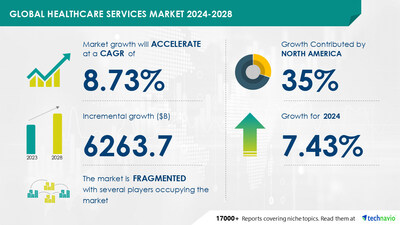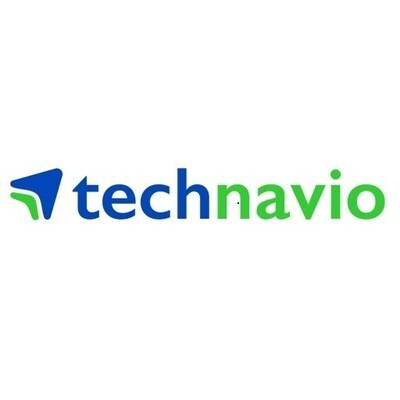The Healthcare Services market is projected to grow by USD 6.26 Billion from 2024-2028, driven by AI and the rising prevalence of chronic diseases, shaping market evolution - Technavio
PR Newswire
NEW YORK, Oct. 23, 2024
NEW YORK, Oct. 23, 2024 /PRNewswire/ -- Report on how AI is driving market transformation - The Global Healthcare Services Market size is estimated to grow by USD 6.26 billion from 2024-2028, according to Technavio. The market is estimated to grow at a CAGR of 8.73% during the forecast period. Increasing prevalence of chronic diseases is driving market growth, with a trend towards rise in adoption of telemedicine in healthcare sector. However, increasing healthcare costs poses a challenge. - Key market players include Apollo Hospitals Enterprise Ltd, athenahealth Inc., Community Health Systems Inc., CVS Health Corp., DaVita Inc., Dr Lal PathLabs Ltd., Expedient Healthcare Marketing Pvt. Ltd., Fresenius Medical Care AG and Co. KGaA, Genesis Healthcare Inc., iHealth Labs Inc., Max Healthcare Institute Ltd, Mayo Foundation for Medical Education and Research, McKesson Corp., OMH HealthEdge Holdings LLC, Optum Inc., Quest Diagnostics Inc., Sonic Healthcare Ltd., Universal Health Services Inc., and West Suffolk NHS Foundation Trust.
AI-Powered Market Evolution Insights. Our comprehensive market report ready with the latest trends, growth opportunities, and strategic analysis- View your snapshot now
Forecast period | 2024-2028 |
Base Year | 2023 |
Historic Data | 2018 - 2022 |
Segment Covered | End-user (Adult care, Geriatric care, and Pediatric care), Service (Hospitals and clinics, Primary care services, Long-term care services, Home healthcare, and Others), and Geography (North America, Europe, Asia, and Rest of World (ROW)) |
Region Covered | North America, Europe, Asia, and Rest of World (ROW) |
Key companies profiled | Apollo Hospitals Enterprise Ltd, athenahealth Inc., Community Health Systems Inc., CVS Health Corp., DaVita Inc., Dr Lal PathLabs Ltd., Expedient Healthcare Marketing Pvt. Ltd., Fresenius Medical Care AG and Co. KGaA, Genesis Healthcare Inc., iHealth Labs Inc., Max Healthcare Institute Ltd, Mayo Foundation for Medical Education and Research, McKesson Corp., OMH HealthEdge Holdings LLC, Optum Inc., Quest Diagnostics Inc., Sonic Healthcare Ltd., Universal Health Services Inc., and West Suffolk NHS Foundation Trust |
Key Market Trends Fueling Growth
The healthcare industry has undergone notable changes due to the increasing use of telemedicine, or telehealth. Telemedicine is a digital communication and technology-based approach to providing remote clinical healthcare services. Its adoption due to its benefits for both healthcare providers and patients. Telemedicine expands healthcare accessibility, particularly for those in remote or underserved areas, allowing them to consult healthcare professionals remotely. During the COVID-19 pandemic, telehealth has been crucial, minimizing viral spread and ensuring continuity of care. Telemedicine also enhances efficiency by using digital platforms for appointments, consultations, and follow-ups, reducing patient waiting times and improving overall satisfaction. Cost savings are another advantage, as patients save on travel costs and time, and healthcare providers streamline operations and reduce overheads. Telemedicine also decreases unnecessary emergency room visits and enhances care coordination and patient monitoring through remote patient monitoring technologies. These factors contribute to the growth of the telemedicine market in the healthcare sector.
The healthcare services market is witnessing significant trends in various sectors. Diagnostics and Imaging are seeing advancements with new technologies. Neurorehabilitation and Psychiatry Services are in high demand due to an aging population. HCA Healthcare, Ascension Health, Tenet Healthcare, Mayo Clinic, and other healthcare systems are expanding their services. Isolation wards and patient beds are essential for Non-emergency Care in Community Hospitals. Inpatient Services account for a larger share than Outpatient Services. Communication technology, patient consumerism, and insurance coverage are driving changes. Quality care, patient engagement, and digital health technologies like Telehealth, Electronic Health Records, and Value-Based Care are key. Regulatory impact and service expansion are important considerations. Publicly owned hospitals and private hospitals offer different advantages. Overall, the market is evolving to meet patient needs while navigating challenges.
Insights on how AI is driving innovation, efficiency, and market growth- Request Sample!
- The global healthcare services market is currently facing substantial challenges due to rising healthcare costs. According to the Centers for Medicare and Medicaid Services (CMS), US healthcare spending grew by 4.1% in 2022, reaching approximately USD4.5 trillion or USD13,493 per person. This trend negatively impacts various aspects of healthcare services, including access to care, quality, and overall sustainability. Reduced access to care is a significant concern as individuals and families struggle to afford necessary medical treatment and services. This results in disparities, with lower-income populations and those without adequate insurance coverage being disproportionately affected. Delayed care can worsen health outcomes and increase the burden on healthcare systems in the long run. Rising costs also negatively impact the quality of healthcare services. Providers and organizations face pressure to reduce costs and operate within tighter budgets, potentially compromising the care provided. This can lead to reduced staffing levels, limited access to advanced medical technologies, and shorter consultation times, all negatively impacting patient experience and outcomes. Moreover, escalating costs challenge the sustainability of healthcare systems. Governments, insurers, and healthcare organizations grapple with financial strain, leading to difficult decisions regarding resource allocation, service prioritization, and cost-containment strategies. These factors may hinder the adoption of healthcare services, potentially impacting market growth negatively during the forecast period.
- The healthcare services market faces various challenges. Infrastructure development is crucial to meet the growing demand for quality healthcare. Chronic diseases require long-term care and management, driving up costs. Medical tourism offers opportunities but also competition. Universal healthcare remains a goal, with telemedicine and patient-centric care key strategies. Strategic partnerships, tele-ICUs, and carbon-neutral hospitals are innovations addressing these challenges. Expenditure on medicine, disease detection, and treatment research continue to rise. Medical service providers, diagnostic laboratories, and dental treatment centers must adapt. Elderly population growth, economic growth, and lifestyle changes impact demand. Bundled payments, digital tools, and cross-industry partnerships drive efficiency. Novel drugs, hybrid imaging techniques, and mental health treatment are priority areas. Hospitals, from state-owned to private and public, offer different services, including cardiovascular, acute care, and cancer care. Healthcare costs, insurance plans, and community health systems are critical considerations. Fresenius Medical Care, Quest Diagnostics, Genesis Healthcare, Universal Health Services, and others shape the market landscape.
Insights into how AI is reshaping industries and driving growth- Download a Sample Report
This healthcare services market report extensively covers market segmentation by
- End-user
- 1.1 Adult care
- 1.2 Geriatric care
- 1.3 Pediatric care
- Service
- 2.1 Hospitals and clinics
- 2.2 Primary care services
- 2.3 Long-term care services
- 2.4 Home healthcare
- 2.5 Others
- Geography
- 3.1 North America
- 3.2 Europe
- 3.3 Asia
- 3.4 Rest of World (ROW)
1.1 Adult care- The healthcare services market continues to grow, with an increasing number of people seeking quality medical care. Hospitals, clinics, and pharmaceutical companies are key players in this market. They offer various services such as diagnosis, treatment, and medication. The market is driven by factors like population growth, aging population, and advancements in medical technology. Providers focus on delivering efficient and affordable services to meet the rising demand. Competition is fierce, so companies invest in research and development to stay ahead. The market is expected to grow steadily in the coming years.
Download complimentary Sample Report to gain insights into AI's impact on market dynamics, emerging trends, and future opportunities- including forecast (2024-2028) and historic data (2018 - 2022)
The healthcare services market is experiencing a significant shift towards patient-centric care, with an increasing focus on patient consumerism and engagement. Insurance coverage continues to play a crucial role in accessing quality care, while digital health technologies, telehealth, and electronic health records are transforming the delivery of healthcare services. Value-based care is gaining popularity, with providers being rewarded for delivering quality care and keeping costs low. Regulatory impact, service expansion, and infrastructure development are key areas of focus for both publicly and privately owned hospitals. Inpatient and outpatient services, chronic disease management, medical tourism, and universal healthcare are major segments of the market. Medical innovation, disease detection, treatment research, and medical service providers are at the forefront of advancing healthcare, while dental treatment, psychological health facilities, long-term care, medical devices, and medical consumables cater to specific healthcare needs. Medical diagnostic laboratories and residential drug abuse facilities are essential components of the healthcare ecosystem.
The healthcare services market is experiencing significant transformation as patient consumerism continues to shape the industry. With the increasing focus on insurance coverage and quality care, digital health technologies like telehealth, electronic health records, and tele-ICU are becoming essential components of value-based care. Regulatory impact, service expansion, and economic growth are driving the demand for healthcare infrastructure, including hospitals and medical facilities. Chronic diseases, medical tourism, and universal healthcare are major trends influencing the market. Telemedicine, patient-centric care, and strategic partnerships are key strategies adopted by medical service providers to enhance patient engagement and improve outcomes. The market encompasses various services, including inpatient and outpatient services, publicly and privately owned hospitals, and long-term care. Chronic diseases, such as cardiovascular and cancer, require specialized care, leading to a rise in demand for cardiovascular, acute care, cancer care, diagnostics, imaging, neurorehabilitation, psychiatry services, gynecology, and other medical services. The market also includes medical device, medical consumables, dental treatment, residential drug abuse, psychological health facilities, and elderly population care. Healthcare costs, hospital type, and communication technology are significant factors impacting the market dynamics. Expenditure on medicine, disease detection, treatment research, and medical innovation are crucial aspects of the healthcare ecosystem. Novel drugs, hybrid imaging techniques, and bundled payments are key areas of investment for medical service providers and diagnostic laboratories. Cross-industry partnerships and community health systems are essential for addressing the needs of underserved populations and improving access to care. Mental health treatment, isolation wards, patient beds, non-emergency care, and communication technology are critical areas of focus for healthcare providers to ensure optimal patient care and satisfaction.
1 Executive Summary
2 Market Landscape
3 Market Sizing
4 Historic Market Size
5 Five Forces Analysis
6 Market Segmentation
- End-user
- Adult Care
- Geriatric Care
- Pediatric Care
- Service
- Hospitals And Clinics
- Primary Care Services
- Long-term Care Services
- Home Healthcare
- Others
- Geography
- North America
- Europe
- Asia
- Rest Of World (ROW)
7 Customer Landscape
8 Geographic Landscape
9 Drivers, Challenges, and Trends
10 Company Landscape
11 Company Analysis
12 Appendix
Technavio is a leading global technology research and advisory company. Their research and analysis focuses on emerging market trends and provides actionable insights to help businesses identify market opportunities and develop effective strategies to optimize their market positions.
With over 500 specialized analysts, Technavio's report library consists of more than 17,000 reports and counting, covering 800 technologies, spanning across 50 countries. Their client base consists of enterprises of all sizes, including more than 100 Fortune 500 companies. This growing client base relies on Technavio's comprehensive coverage, extensive research, and actionable market insights to identify opportunities in existing and potential markets and assess their competitive positions within changing market scenarios.
Technavio Research
Jesse Maida
Media & Marketing Executive
US: +1 844 364 1100
UK: +44 203 893 3200
Email: media@technavio.com
Website: www.technavio.com/
![]() View original content to download multimedia:https://www.prnewswire.com/news-releases/the-healthcare-services-market-is-projected-to-grow-by-usd-6-26-billion-from-2024-2028--driven-by-ai-and-the-rising-prevalence-of-chronic-diseases-shaping-market-evolution---technavio-302284193.html
View original content to download multimedia:https://www.prnewswire.com/news-releases/the-healthcare-services-market-is-projected-to-grow-by-usd-6-26-billion-from-2024-2028--driven-by-ai-and-the-rising-prevalence-of-chronic-diseases-shaping-market-evolution---technavio-302284193.html
SOURCE Technavio




